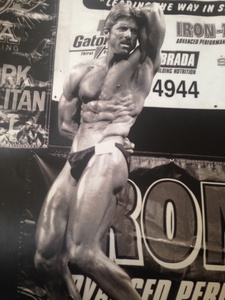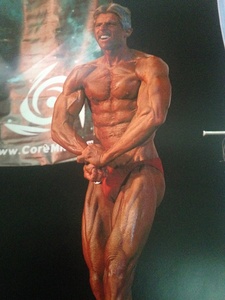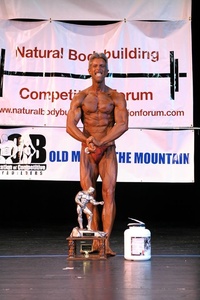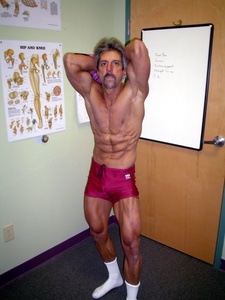I had the honor of interviewing one of the best drug-free bodybuilders to ever set foot on stage. With on-stage competitive experience dating back to 1984, Aram Hamparian has gained an enormous amount of knowledge and wisdom that we can all learn from.
Once you read Aram’s answer to what originally got him motivated to compete, you’ll have chills running down your spine and you’ll get a glimpse of the inner strength of this very special man and how his life has been the very definition of the word transformation.
What is your age, height and weight? When you competed, what was your competition weight? And what was your off-season weight?
I am 58.5, 5′ 9″ and my best competition weight was around 152 pounds. Off season I went as high as 170.
How many years did you compete and how many shows have you competed in? What got you motivated to start competing?
I’ve competed in 96 shows going back to 1984. My motivation stemmed from something I overheard a few nurses state when I was leaving another hospital for drug abuse. “This guy will probably be back again real soon.” “No, he’ll be dead before that happens.” That was in 1983, and I’ve been straight ever since. I was involved in just about every recreational drug invented and about the time crack was getting popular on the streets, that’s when I went cold turkey. If I ever touched crack, due to my addictive nature, I’m pretty sure I wouldn’t be here right now.
When was your first show and what show was it? Describe that first experience on stage.
It was a show at Bronx Community College. I can’t remember the org, but I was hooked. Oh, and I came in last in my class!
What has been your most satisfying victory or placing and why?
Probably my last show back in 2010. At the age of 52, I won the open, 40+, 50+, best poser, and the overall at an OCB show. Another was the NPC East Coast Nationals at the Tribeca. I came in second in the lightweight class.
Who have been your biggest influences in bodybuilding?
My dad. He was always fitness conscious and even won the Mr. NYC back in the ’40’s. Other than that, I really did not follow the more popular bodybuilders showcased in the magazines. So, with that said, I never followed their training principles and always constructed my own training routines and learned from my mistakes.
Has bodybuilding helped with any personal obstacles or challenges in your life that you’ve had to overcome?
Self-discipline, and teaching me not to rely on anyone to achieve my goals. Inspiration from another entity can only go so far. But if you lose your confidence and sense of freedom, you’ll probably just be part of the herd.
I remember first seeing you at a NY State competition in Tarrytown, NY around 2000 or 2001 and was blown away by your stage presence. You know how to pull energy and eyes towards you and you’re a very graceful and skilled poser. You obviously practiced a lot and took it as seriously as you do training and nutrition. How often did you practice posing leading up to a show? And, who are your favorite posers in bodybuilding (past or present)?
Actually, it was my mom. She was a professional dancer/ballerina and traveled the country with the USO before she was married. She lost the sight of one eye but that didn’t detract her. She loved being onstage and I believe I inherited that “ham” aspect from her. I took more pleasure in winning best poser awards rather than class wins. I believe that there’s been only one show where I did not win Best Poser.
One of the many things that impressed me about you is that you not only do extensive research on training, nutrition, and supplements but that you also have a strong appreciation for health. Tell us about how you apply science to succeed in bodybuilding and how you blend health into this mix.
I probably spend 3-5 hours a day reading and researching everything that has to do with training and nutrition. I had the good fortune of working directly with Alan Aragon in the off -season before my final show and learned things which I still apply today. Bodybuilding is not an exact science sort of endeavor. The research is constantly evolving and you must stay on top of the latest studies, analytics, etc., and learn how to apply them in the real context of the gym. I’ve also trained in Vince Gironda’s gym and he wasn’t too kind to me at first. LOL. But then he gave me incredible insight with exercises.
Aside from training and competing, what are your interests or hobbies? And, has competing influenced these parts of your life?
Guitar (I played in a band in the 80’s). I also volunteer at the local shelters here in the Bronx. That, to me, is way more rewarding than just about anything I’ve done, or any hobby I might enjoy.
I’ve learned a lot from some of the shows that I haven’t done well in. What show(s) have been disappointing for you (if any) as far as your conditioning/placement? Did you learn a lot from them? Please give an example.
I played the size game a number of times. I found out that I do MUCH better at 151 pounds than 161 pounds. The more shredded you are under the lights, the larger and more dimensional you appear. This is the illusion of competitive bodybuilding.
How many weeks out did you begin getting ready for a show and how did you handle your approach to nutrition both pre-contest and off-season?
Well, I’ve done so many shows, that my prep has been anywhere from 6 months to 6 days!
Did your training change during pre-contest versus off-season? If so, in what way?
The only change I make pre-contest is to lower the volume and train heavier with lower rep ranges. I also do no conventional cardio. I walk a lot, but if you want to get me to do LISS or HIIT, that’s not going to happen.
How are you currently training (split, sets reps)? And, how would you describe your training philosophy?
Currently, I’m doing a Push/Pull/Legs split but I’ve done just about everything from a Smolov routine to German Volume to HIT and DoggCrapp.
In your training, how do you approach the much-debated volume and frequency topic? In other words, are you more of a high volume trainer? Low volume? High frequency? etc.
I like training with less volume, more frequency. The body part split doesn’t lend itself optimally for the natural bodybuilder. I also believe that if one is natural, they should train heavier. You often see these IFBB guys doing bicep curls with 25 pound DB’s and state that you don’t need heavy weight. However, protein synthesis is not equal for the natural as it is for the enhanced. The natural’s normal state is homeostasis. Also, high rep work drives more blood into the enhanced muscles further taking advantage of their heightened environment of protein synthesis. And if they use heavy weight, their muscles will grow stronger than their muscles leading into all the injuries you hear with them.
When you were starting out or even as you gained more experience, what muscle group was your most challenging to bring up and what strategy did you use to improve it?
Upper chest and legs. I had to work extra hard to bring them up. Not more volume, but more intensity of effort.
Which are your favorite exercises and least favorite?
I would have to say squats (which I no longer can do), dips, pull ups, leg presses, and Romanian Deadlifts. Oh, and DB Rows. My LEAST favorites are leg curls, leg extensions, and any type of bicep curl. I HATE bicep curls!! 🙂
Do you have any chronic injuries that you need to train around? And, are there specific exercises that you need to avoid due to the risk of injury?
I have a very serious nerve disorder. Basically, I am unable to produce sufficient spinal fluid on my own. I suffer from tremors in my lower body, and often times my limbs, both upper and lower, go numb.
Please describe your current nutrition intake whether it be a sample day, macros, or foods you consume.
My diet is very clean but I enjoy all the goodies too. Living in the Bronx exposes me to a lot of authentic Italian Deli’s which offer the best sandwiches, pizza, eggplant dishes. And Cuban food is abundant here, too!!
What supplements do you take and why do you take them?
I’m not really a supplement guy anymore, but there are a few which I try and use year round. Creatine, HMB, a green superfood type powder, desiccated liver, and a whey isolate. I also like citrulline. The research on it is extensive and there are many health benefits.
How did you mentally prepare right before you walked out on stage for a show?
A friend of mine once came back from Marine Boot camp. He said that when he was at the airport on his way home, he looked at all the people and told himself how superior of a being he was to everyone. LOL. I guess his months in boot camp did a number on his self-confidence. I would always think of that whenever I walked out onstage. Thinking how much better I was than everyone. No matter how terrible I looked! Ha!!
Did you find off-season difficult from a dieting standpoint?
Yes! I actually liked pre-contest dieting due to the discipline involved. I noticed that every other aspect of my life would become heightened because of my attention to detail and laser type concentration.
Name 2-3 competitors you admire and why. Just go with who immediately comes to mind.
I competed against a guy in the old NBI, Isaac Torres. Probably the best natural bodybuilder I’ve ever seen. He pushed me to limits I never knew I could achieve because I eventually won my pro card in that org. Two other guys would be Kent Bierly and Sean Sullivan. Two fellow natural pros’s who have probably competed in more shows than I have! And of course, you Raphael. For a guy who is older than I am, you look so much younger and I have always felt that you set the standard for having the best leg development I’ve ever seen in natural bodybuilding.
The great debate – peanut butter: crunchy or smooth?
Ha, I’m a smoother, Lol.
What crazy food myths (if any) did you once buy into as a competitor?
You shouldn’t eat carbs before bed. You should eat every 2-3 hours to facilitate fat loss and muscle gains. You can only process 30 grams of protein at one meal. Sugar is the enemy. Avoid salt. You must eat 6 meals a day. Avoid fruit and most of all, fructose……. All myths I bought into.
What’s your favorite “cheat” food?
Ice cream. And if I have a gallon, I’m usually incapacitated for a week because I’m severely lactose intolerant!
What was the worst advice you’ve ever been given either from a nutrition, supplement or training standpoint?
Wow, there have been so many. But one that comes to mind is “Keep your fats and sodium as low as possible during peak week”, and “If you don’t squat, you’re not going to win any shows.”
I have found that many (not all) competitors, both experienced and inexperienced, can sometimes be closed- minded when it comes to advice. What advice would you give to someone from a nutrition, training and attitude perspective who was interested in competing?If you decided to compete, you can’t cut corners. You have to work hard and consistently and not search for short cuts. You have to eat a certain way, every day. And you can’t miss any training sessions. This must remain constant no matter what else is going on in your life. As we all know, “life happens”. Yet, as a competitor, you must cast aside all the usual turmoil of everyday life.
People sometimes forget that in order to do well in a show, it’s important to have support. Who have been your biggest supporters?
My family. Specifically, my mom and sister.
Aram, what else would you like to add?
I’d like to thank you for the opportunity, Raphael. You have not only been a long-time friend, but also a tremendous source of encouragement. You are an object lesson on professionalism, knowledge, and being an elite Bodybuilder. We all can benefit from you.
I have been an online personal trainer since 2005. I customize nutrition and training plans for a wide range of populations, from the competitive athlete/bodybuilder, to the everyday busy working mother simply wishing to drop a few pounds and feel and look great. My contact info is hamparian7@aol.com
Thank you again, Raphael…





2 comments
Great interview with an accomplished man, and judging from his answers, has overcome many obstacles. To me, this is what makes a great champion – overcoming adversity. Congratulations. Respectfully, Bill Neylon
Well said, Bill. Thanks so much for reading.